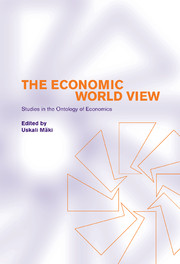Book contents
- Frontmatter
- Contents
- Notes on the contributors
- Preface
- I The what, why, and how of economic ontology
- II Rationality and homo economicus
- Part III Micro, macro, and markets
- Part IV The world of economic causes
- Part V Methodological implications of economic ontology
- 17 Sargent's symmetry saga: ontological versus technical constraints
- 18 Two models of idealization in economics
- 19 The way the world works (www): towards an ontology of theory choice
- Name index
- Subject index
18 - Two models of idealization in economics
Published online by Cambridge University Press: 04 August 2010
- Frontmatter
- Contents
- Notes on the contributors
- Preface
- I The what, why, and how of economic ontology
- II Rationality and homo economicus
- Part III Micro, macro, and markets
- Part IV The world of economic causes
- Part V Methodological implications of economic ontology
- 17 Sargent's symmetry saga: ontological versus technical constraints
- 18 Two models of idealization in economics
- 19 The way the world works (www): towards an ontology of theory choice
- Name index
- Subject index
Summary
Economics and social sciences in general can be troubling because of their lack of utility in making accurate quantitative predictions. The trouble cannot be simply written off to the complexity of the phenomena to be predicted because physical phenomena are at least as complex on most sorts of complexity metrics that one might try to imagine. Modern physics is able to work through complexity by means of idealizations which enable us to simplify our analyses to the point where they have quantitative results that actually prove useful. Let us examine the suggestion that idealization in economics is different from idealization in physics (which is not yet to suggest that the difference implies a fault) to see whether we might get some perspective on the quantitative performance of economics.
The nature of idealization in science is, of course, not fully understood – not even in physics. There are, however, some aspects which have been well understood since the time of Newton and Leibniz. Physics, for example, postulates such ideal entities as point masses, ideal gases, and frictionless planes. One reason that the name ideal is appropriate for these entities is that they clearly differ from any real massive body, sample of gas, or surface of an object. And the difference is not restricted to the fact that point masses have less volume than actual bodies, ideal gases less intermolecular attraction, and frictionless planes less friction than their real counterparts. It is quite impossible that there be a massive body with no volume, gas molecules that exert no attractive forces on each other, and surfaces without friction.
- Type
- Chapter
- Information
- The Economic World ViewStudies in the Ontology of Economics, pp. 359 - 368Publisher: Cambridge University PressPrint publication year: 2001
- 1
- Cited by



